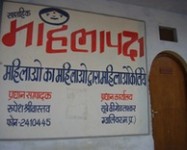Reporters who cannot write

Women¿s Feature Service
¿Mahila Paksha¿ is a Hindi weekly newspaper published from
Yet, these voluntary female correspondents - who focus on community news and issues that make a difference to women - are effective communicators. A majority of them from humble backgrounds, they gather their information from municipal ward offices and elsewhere and effectively communicate the news to the team at the newspaper office. It is this team that then writes the articles and packages them as ready-for-print news.
Since the last four years, the eight-page ¿Mahila Paksha¿ has commanded a presence among women readers. Says Samanvaya Shrivastava, Chief Editor, ¿Mahila Paksha¿: "We try to create an awareness among women. Women are beginning to feel that they can also do something in life. They are realising that they occupy an important place in society."
As a result of the initiative and the nationwide network of its reporters - the
Laxmi says, "¿Mahila Paksha¿ helped me get justice. I have understood that I can also achieve something in life through my efforts." She is now a regular reporter with the newspaper.
In another case, a harassed group of women college teachers and students benefited from a news report featured in the paper. Kalpana Saxena, a guest lecturer at a
When the story finally appeared in 2005, the vice-principal was transferred. His transfer order was accompanied by a clause that he would never, in future, work at a women¿s college. "It was only after ¿Mahila Paksha¿ took up the issue that the matter was brought to light and the authorities paid attention to the situation. In the subsequent issue, we even mentioned the action taken up by the authorities," says Shrivastava. She adds, "We have a policy of following up on an issue until the matter is solved. After that, we inform our readers about the action taken."
In addition to highlighting oppression, the newspaper carries positive articles about women. Political leaders who speak about women also find their speeches covered by the publication.
Priced at Rs 2 (alternatively, there is an annual subscription of Rs 100) with a circulation of over 12,000, the newspaper is distributed to subscribers by its city reporters. Despite the low revenue, the newspaper chooses news over advertisements. "Advertisements get a place only when there is space left after all the news of the week has been positioned. The newspaper never withholds the news of its reporters to accommodate an advertisement," says Shrivastava.
¿Mahila Paksha¿ is a family-run broadsheet established in 2003 by senior journalist Rupesh Shrivastava, 51. The weekly editions are brought out by his daughter, Chief Editor Samanvaya, and his wife, Ashalata, who also works as a Supervisor in the Department of Women and Child Development and, of course, Rupesh. The trio compiles the inputs that the women bring in, crosschecks facts, and brings out the final print edition. However, their most valuable input has been to encourage women to find their voice, throw light on issues of fraud, corruption and inequality, and discover their unconscious competence.
Says Kamini Chauhan, a stringer with the weekly, "I realised my potential only while working here. I believe I can do anything. I can approach any authority for my work now." Sandesh Bansal, who works for a local NGO, Jan Adhikar Manch, reflects, "The newspaper has helped create awareness. Women now feel that they can do something."
Incidentally, for those who wish to become reporters of ¿Mahila Paksha¿, the prerequisites for the job are simple. Samanvaya explains that a reporter must have three qualities, "She should be enthusiastic, zealous and honest."
Rupesh is keen to take the weekly to






